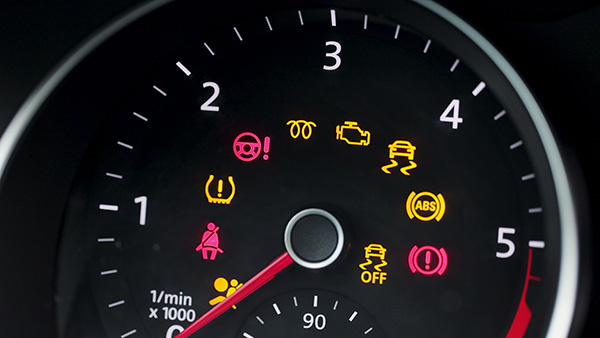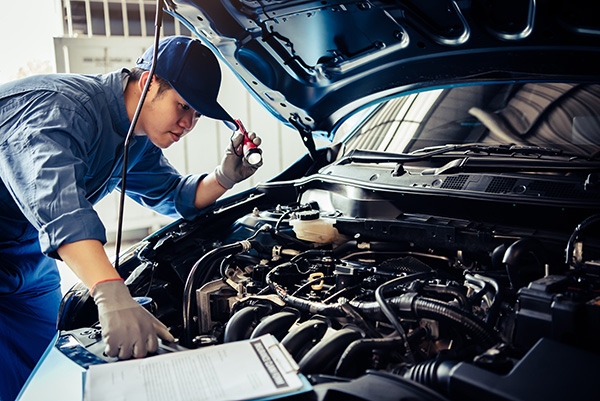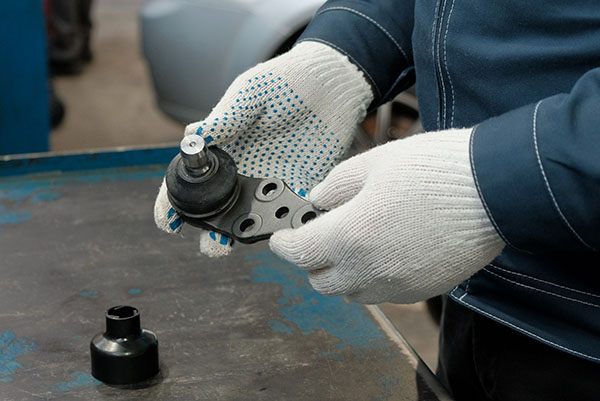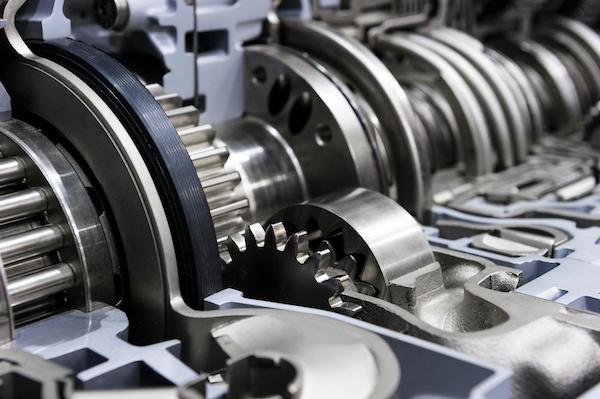Posted on 5/28/2024

Hybrid cars have gained immense popularity in today's automotive landscape due to their eco-friendly nature and fuel efficiency. However, regular maintenance is essential to ensure optimal performance and longevity. Here are the benefits of regular hybrid car service and why it's crucial for every vehicle owner. 1. Improved Fuel Efficiency Regular hybrid car service involves checking and optimizing various components such as the engine, battery, and electronic systems. This ensures that the hybrid system operates at peak efficiency, leading to improved fuel economy. By addressing any underlying issues promptly, drivers can enjoy significant savings on fuel costs over time. 2. Prolonged Battery Life The battery pack is a critical component of hybrid vehicles, powering the electric motor alongside the internal combustion e ... read more
Posted on 4/26/2024

Have you ever been startled by a sudden warning light flashing on your dashboard, signaling potential trouble ahead? In this article, we'll discuss vehicle electrical systems, their care, and common issues you might have. The Importance of Vehicle Electrical Care Your vehicle's electrical system is the nerve center, responsible for powering essential components such as lights, ignition, and entertainment systems. Neglecting proper maintenance can lead to a myriad of issues, ranging from minor inconveniences to serious safety hazards. By prioritizing electrical care, you can ensure smooth operation, reliable performance, and peace of mind on the road. Warning Lights and Their Meanings When warning lights illuminate on your dashboard, they're not to be ignored. Each light serves as a signal, indicating potential problems that require attention. From the dreaded check engine light to the battery indicator, understanding the meanings ... read more
Posted on 3/27/2024

Every car owner dreams of keeping their beloved vehicle running smoothly for as long as possible. However, achieving this requires more than just the occasional oil change or tire rotation. In this comprehensive guide, we'll explain the intricacies of car maintenance and repair, uncovering essential tips and techniques to extend your vehicle's lifespan and keep it purring like a kitten for years to come. Understanding Your Car Let's take a moment to familiarize ourselves with a car's inner workings. Every component plays a crucial role in ensuring your vehicle operates efficiently and safely, from the engine to the transmission, brakes to suspension. Understanding these systems empowers you to identify potential issues early on and take proactive measures to address them. Routine Maintenance is The Key to Longevity Regular maintenance is the ... read more
Posted on 2/27/2024
%20(Small).jpeg)
Choosing the right engine oil for your vehicle can sometimes feel like navigating a maze of numbers and letters. Engine oil grades, often represented by combinations such as 5W-30 or 10W-40, play a crucial role in maintaining the health and performance of your car's engine. What Do Engine Oil Grades Mean? Engine oil grades consist of two parts: the viscosity grade and the performance level. The viscosity grade, represented by the numbers before the "W" (which stands for winter), indicates the oil's flow characteristics at different temperatures. Lower numbers indicate thinner oils that flow more easily at low temperatures, while higher numbers denote thicker oils that provide better protection at high temperatures. Viscosity Grades The viscosity grade of engine oil is crucial for ensuring proper lubrication and protection of ... read more
Posted on 1/31/2024
.jpeg)
Are you tired of your car consuming gas like there's no tomorrow? It's not just about the money – being fuel-efficient is a badge of honor in today's eco-conscious world. Transforming your car into a model of fuel efficiency might be easier than you think - let's start with a few tips from us. The Foundation of Fuel Efficiency The journey to fuel efficiency starts with regular maintenance. It's simple – a well-maintained car runs more efficiently. The classic oil changes, air filter replacements, and spark plug checks can significantly improve your car's fuel economy. Think of it as keeping the engine "happy" – a happy engine doesn't have to work as hard, which means less fuel consumption. Tire Pressure Did you know that properly inflated tires can improve your fuel efficiency by up to 3%? It's ... read more
Posted on 12/5/2023

Ball joints, although often overlooked, play a pivotal role in your vehicle's suspension system. These small but mighty components connect the steering knuckles to the control arms, allowing for smooth and controlled movement of your wheels. Understanding the signs of worn ball joints is essential for maintaining your vehicle's performance and safety. 1. Unusual Tire Wear Keep a close eye on your tires, especially if you notice uneven or accelerated wear. Worn ball joints can disrupt the proper alignment of your wheels, leading to irregular tire patterns. If you observe excessive wear on the inner or outer edges of your tires, it could be a red flag signaling compromised ball joints. 2. Knocking or Clunking Sounds Audible signals such as knocking or clunking sounds, particularly when navigating bumps or rough terrain, may indicate worn ball joints. As these components deteriorate, the connection between the suspension and steering system be ... read more
Posted on 11/30/2023
%20copy.jpg)
In the intricate balance of engine components, the cooling system's performance can sometimes waltz into the territory of malfunction. In this guide, let's explore the subtle signals that your vehicle might be sending, indicating a malfunction. Luckily, being aware of these subtle signs can help you keep your car in top condition and avoid any potential issues on the road. Let's dive into the details so you can feel confident and assured while driving on the asphalt! Steamy Situations You pull into your driveway, turn off the engine, and suddenly, wisps of steam start emanating from beneath the hood. This dramatic display is not just a spectacle or a one-time thing - it's your car's way of signaling an overheating cooling system. Steam escaping from the radiator cap or around the engine is a clear cry for help. Ignoring this sign can lead to severe engine damage, so consider it a plea for immediate attention. A Dancing Temperature ... read more
Posted on 10/30/2023

Toyota, renowned for its reliability and practicality, has ventured into the realm of high-performance vehicles with the exhilarating GR Corolla. Breaking away from its traditional conservative approach, Toyota's in-house tuning group, Gazoo Racing, has infused this compact sedan with a potent 300-horsepower turbocharged 1.6-liter 3-cylinder engine, elevating the Corolla to new heights of power and excitement. That's only a little info about it, so if you want to take a closer look, continue reading! Performance Prowess Under the hood of the GR Corolla resides a 1.6-liter 3-cylinder engine, meticulously fine-tuned by Gazoo Racing to produce a staggering 300 horsepower. This power boost, complemented by an all-wheel-drive system and a six-speed manual transmission, unleashes unparalleled agility and responsiveness, transforming the humble Corolla into a powerhouse ... read more
Posted on 9/30/2023

Driving your Ford is usually a smooth experience, but every now and then, your car's onboard computer system may decide to communicate with you in a language you didn't quite learn in driving school. These messages often come in the form of error codes, a cryptic sequence that seems to have emerged from the depths of your vehicle's soul. Gear up and join us as we unveil the secrets behind them. P0171 & P0174 - System Too Lean When your Ford displays the P0171 and P0174 error codes, it's trying to tell you that your engine is running too lean. This means there's an imbalance in the air-to-fuel mixture, with too much air and not enough fuel. The culprits behind this code could include vacuum leaks, a malfunctioning mass airflow sensor, or a clogged fuel filter. P0300 - Random/Multiple Cylinder Misfire Imagine your engine as a well-choreographed dance, with each cylinder taking its turn to fire and propel your car forward. A P ... read more
Posted on 8/31/2023

One of the most vital players in an automobile is the transmission, often referred to as the gearbox. Yet, unlike the more recognizable parts of your vehicle, the transmission remains shrouded in mystery for many. Today, we unveil the secrets of this critical component and provide you with a glimpse into the intricate world of transmissions. At its core, the transmission is responsible for transmitting power from your engine to the wheels. Think of it as a sophisticated system of gears that adapts the torque and speed generated by the engine to match your driving needs. Manual vs. Automatic: There are two primary types of transmissions: manual and automatic. A manual transmission requires the driver to manually shift gears using a clutch pedal, while an automatic transmission handles gear changes automatically based on driving conditions. CVTs and Dual-Clutch Transmissions: Constantly Variable Transmissions (CVTs) and Dual-Clutch Transmissions are modern innovations. CVTs offer seam ... read more